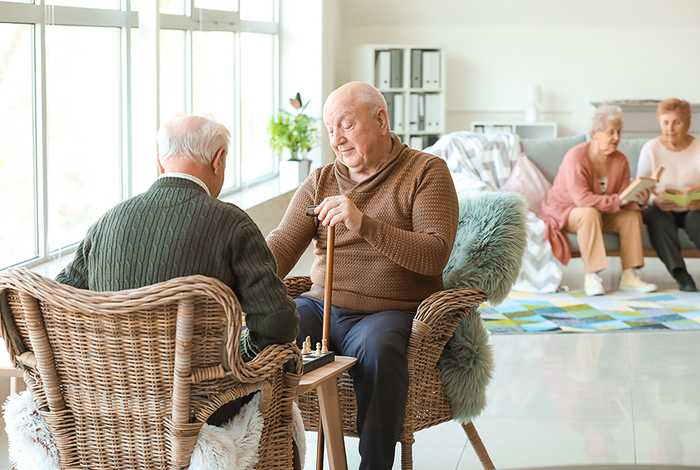Posted by Janine Griffiths
Overnight care at home

As the world winds down and the sky fades to a deeper blue, night brings with it a sense of stillness. But for many older adults, it can also be when worries feel the loudest. Whether it's concerns about getting to the bathroom safely, managing medication, or simply not wanting to feel alone through the darkest hours, night-time can be challenging.
That’s where overnight care at home can make a meaningful difference. It's a type of support designed to bring comfort, reassurance and practical help through the night – all within the familiarity of your own home.
In this blog, we’ll explore what overnight care really involves, who it can help, and how to find the right kind of support. If you’ve ever wondered what options are available when the sun goes down, this guide is here to offer clear, friendly advice that puts you – and your peace of mind – first.
Who might benefit from overnight care?
If you or a loved one needs medication during the night, or struggles to manage day-to-day tasks, overnight care may be right for you or your family.
Alternatively, if you or your family need their position changed in bed, due to spinal injury or bed sores, an overnight carer can help with this as well.
It can be especially helpful for those living with dementia, where night-time confusion or wandering is more likely. People recovering from a stay in hospital, or those with a higher risk of falls, may also feel safer knowing someone is nearby. Even things like managing continence can become easier with the right support.
Family members often try to step in, but broken sleep and constant worry can take a real toll. Overnight care offers a gentle solution - providing practical help while giving everyone the reassurance of being in familiar, homely surroundings. It's about comfort, safety and a better night’s sleep for everyone.
Types of overnight care
Not all night-time support looks the same. The kind of care someone needs after dark can vary depending on their health, mobility and sense of independence. That’s why overnight care at home is designed to be flexible, with different types of care to suit different routines and levels of support.
For some people, a gentle presence in the home is all that’s needed. This is often called a “sleeping night” or “overnight sleeping” carer - someone who stays overnight and is available if help is needed but otherwise rests in a nearby room. It’s ideal for those who may not need constant attention but still want peace of mind that someone is close by.
Others may benefit more from a “waking night” carer. This type of support involves a carer staying awake throughout the night, ready to assist whenever needed. Whether it’s regular repositioning, help with medication, or managing dementia-related restlessness, a waking night carer provides active support throughout.
Choosing the right type of overnight care means thinking about comfort and safety, but also about the rhythm of your nights. The right fit should feel natural and reassuring, giving you the confidence to rest deeply in your own home.
Key benefits of overnight care at home
There’s something uniquely comforting about knowing you’re not alone in the middle of the night. Whether you’re someone needing support or a loved one keeping watch from afar, having help close by can lift a weight off everyone’s shoulders. Overnight care at home is about more than just practical support, it’s about creating peace of mind when it’s needed most.
Emotional reassurance
One of the biggest benefits is emotional reassurance. Just knowing there’s someone nearby to help if needed can ease anxious thoughts and make it easier to fall and stay asleep. For families, it brings the relief of knowing their loved one is safe, even when they can’t be there in person.
This kind of care also helps reduce the risk of falls or health emergencies during the night. With someone on hand, small concerns don’t have to become bigger problems.
Better sleep
For those living with conditions like dementia or Parkinson’s, it can be especially valuable. Overnight care supports a calmer, more restful night, which often leads to better wellbeing during the day.
Promotes independence
Perhaps most importantly, it allows many people to stay in their own home for longer. With the right help in place, day-to-day independence becomes easier to maintain, and the idea of moving into residential care can often be postponed - or even avoided altogether.
What does an overnight carer actually do?
It’s easy to wonder what a carer really does during the quiet hours of the night. Is it constant activity? Is it just being nearby? The truth is, overnight care at home can be both practical and gentle, shaped entirely around what you need to feel comfortable and secure.
A typical night with a carer begins with helping you get settled - whether that’s with personal care, taking medication, or simply winding down. From there, the carer may stay awake throughout the night, ready to offer support whenever it’s needed. This could mean helping with toileting, adjusting sleeping positions, or calming moments of restlessness.
Alternatively, if you only need occasional help, a carer can rest nearby and respond if called. That quiet presence alone can be enough to bring a sense of calm and safety.
What makes this kind of care so personal is its flexibility. Your preferences, health needs, and nightly routine all shape how the carer supports you. Whether you wake often or sleep right through, the care fits around you - not the other way around.
How much does overnight care at home cost?
When thinking about overnight care at home, one of the first questions people naturally ask is, “how much will it cost?” It’s an important part of the decision, and understanding what affects the price can help you plan with clarity rather than worry.
The cost of overnight care can vary depending on the level of support you need. A sleeping night carer, who is only called upon occasionally, will usually cost less than a waking night carer who stays alert throughout the night. Other factors like location, complexity of care, and whether the support is occasional or ongoing can also influence the price.
There may be financial help available. Some people qualify for means-tested support from their local authority, especially if care needs are significant and savings are limited. In some cases, NHS Continuing Healthcare might also cover the cost, particularly when health needs are complex and ongoing.
If the funding side feels confusing, you’re not alone. It’s worth seeking advice early, so you can explore your options and feel confident in your choices. Planning ahead means you’re not caught off guard and can focus more on what really matters: finding care that helps you feel secure, supported and at ease.
How to find an affordable overnight live-in carer
If you are looking for a home carer or live-in carer that aligns with your budget, Autumna can help. You can find care providers by heading over to the search bar on our website, selecting the type of care you need, typing in your location and pressing enter. There are also tabs above the search results where you can filter care providers by price and other criteria. Alternatively, you can also use our shortlisting tool to receive an even more personalised list of suggestions. If you need to speak with someone, our friendly and knowledgeable care team are available on 01892 335 330.
Rest easy with the right support
The night should be a time for calm, comfort and rest - not for worry, loneliness or uncertainty. If you’ve been finding nights more challenging than they used to be, or you’re concerned about a loved one’s safety or wellbeing in the dark hours, it’s worth knowing that you don’t have to manage it all alone.
Overnight care at home offers more than just help with tasks. It brings reassurance, peace of mind and the freedom to stay in your own familiar surroundings with confidence. Whether it’s a gentle presence nearby or more active support through the night, having someone there can make a world of difference.
For many families, just knowing this kind of care exists is the first step toward a better night’s sleep. The next step is exploring your options - calmly, thoughtfully and in your own time. By planning ahead and finding the right support, you can feel more in control and more at ease. Because everyone deserves to feel safe, cared for and well-rested, no matter what the clock says.
Receive a Free Home Care Shortlist!
Let our expert team of advisers get your search off to a great start.
Tell us a little about your needs and we'll send you a bespoke shortlist of home care providers! Click the button below to begin, it takes just a few minutes.
Other articles to read
From the blog

Older Persons Care Advice
Annuities for care home fees: Everything you need to know
October 23rd, 2025
Learn how annuities for care home fees provide guaranteed income, financial stability, and peace of mind when planning for long-term care costs.

Older Persons Care Advice
Care options for the elderly: What is right for you?
October 17th, 2025
Discover care options for the elderly that fit your needs, from home support to residential care, helping you plan confidently for the years ahead.

Older Persons Care Advice
Are next of kin responsible for care home fees
October 17th, 2025
Find out the truth about care costs. Are next of kin responsible for paying care home fees? Learn who pays, exceptions, and how to plan ahead.
Frequently Asked Questions
Not at all. While it’s helpful for medical needs, overnight care can also support general wellbeing, safety, or companionship for those living alone.
It depends on how often you need support during the night. If you wake frequently or need regular assistance, a waking night carer may be best.
Yes. Many providers offer flexible arrangements, including short-term support after hospital discharge or during recovery from illness or surgery.
Most care agencies aim for consistency, especially when ongoing support is required. You can request continuity to build trust and comfort.






